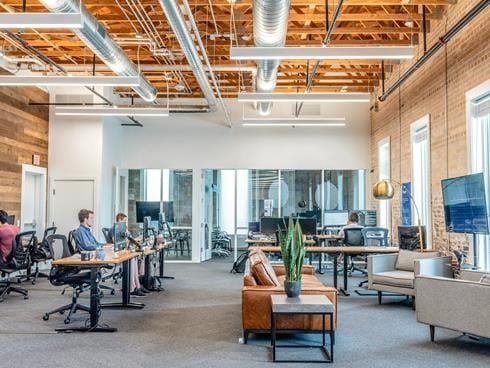Nick Millican weighs in on the considerable changes in office space and cultures in the wake of the COVID-19 pandemic.

Are office spaces going the way of the dinosaur? Attitudes toward workplaces have seen a seismic shift, influenced largely by the global coronavirus pandemic. These attitudes, in turn, have led to a new way of thinking about the physical office, and commercial real estate professional Nick Millican believes employers and office providers would do well to take heed.
“A lot of mainstream corporates have viewed their real estate as a cost center where their real estate team’s job was to lower the cost per desk and drive efficiency. So, you ended up with people being crammed into very dense spaces that were typically open plan and generally not great-quality offices,” says Nick Millican. “I think there’s been a fairly vociferous reaction against that attitude now because it’s hard enough to get people to come back to the office. That is a pronounced change relative to 2019.”
Post-pandemic, it’s difficult to get people back to in-person employment because they now know there’s a better way to view the office space ? and they realize there’s an alternative to the old ways.
For many staffers, attendance in the physical office is no longer a requirement of their jobs ? or it shouldn’t be, in their view. People feel they have proven over the past few years that they can be just as productive away from the office, working from home, as they ever were in cubicles stacked on top of each other. Such attitudes are often to the consternation of employers and business owners who want their workforce back in one place ? not only so that they can manage and monitor them, but also because they want to utilize the expensive outlays they’ve made in renting office buildings.
How Office Spaces Will Be Used in the Future
Nick Millican has strong views on how the next couple of years will play out in terms of remote work versus returning to the office. From deep experience as both a commercial real estate provider and an employer, he believes the current environment will continue to exist, where expectations of hybrid work remain pervasive in the workforce.
“I don’t think we will get back to exactly the way things were in 2019,” says Millican of the pre-pandemic way that people thought about their work environment and expectations that employees should be in the office five days a week. “Managers now say of their people, ‘Look, if we are going to drag our staff 45 minutes away from their house to come and work in the same place, then we have to do a better job of making that place somewhere they’d actually like to be.'”
Faced with a workforce uninterested in returning to the office, many companies came up with clever ideas to entice people back. They organized pizza parties, dress-up days, casual clothes days, and even happy hours.
But these ideas have proved superficial, thinks Millican. Offering free pizza for lunch or happy hours might bring people back for a certain amount of time, but they’re not sustainable ways of attracting people back over the long term, he believes.
Yet that’s not to say that the physical office as we know it is facing total extinction. Even the most cynical, pro-remote-work professional would admit that offices have their place.
Where employees and employers seem to broadly meet on the subject, notes Millican, is on the benefits of a workforce coming together.
“It’s about two things: collaboration and culture,” says Nick Millican.
Offices Should Take on New Meaning for Workers
As much as it’s true that people need time alone and a quiet space to do specific tasks ? like writing, analysis, and accounting ? it’s also true that teams are better when they collaborate.
It’s also true that it’s hard to build a corporate culture if people don’t meet regularly ? in the flesh ? to network, collaborate, and generally get to know each other. From a professional perspective, one of the many things lost during the enforced lockdowns of the pandemic, according to Millican, were the little moments in the office. Chance meetings at the watercooler that sparked productive conversations and solutions to left field problems. Off-the-cuff insights from senior company members that helped more junior employees understand an issue from a different perspective.
“The feedback we hear from tenants in buildings is that it is very difficult to build any sort of a team culture remotely,” says Nick Millican.
So, to solve the back-to-work conundrum, Millican believes employers and commercial real estate providers need to have a deeper understanding of what workers need out of their office space and their time in the office and take the time and the investment to address those needs, both now and in the future.
Nick Millican: Business Spaces Need a Rethink
Nick Millican believes that while each business will have specific needs depending on their sector, size, and current office culture, there are nonetheless some needs and solutions common to the majority of office-based businesses.
A greater emphasis needs to be on providing spaces where your workforce can collaborate, says Millican. For instance, more meeting rooms furnished with the latest collaboration technology. Places where workers can informally meet. Healthier spaces that consider light, air quality, and the flow of people throughout the building.
For Nick Millican, it’s unlikely that the business world is ever going back to the “normal” of the pre-pandemic era. Yet office spaces need not simply be cost centers anymore. Instead, with the right attitude and understanding, they can be places that help companies foster collaboration and promote culture.







